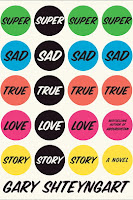 |
| The Frisbee Book Blog Book Awards! |
We had the National Book Awards in November, the National Book Critics Circle Award in March, the PEN/Faulkner Award in March, and the Pulitzer in April. I pay attention to the National Book Award, because there's a lot of fuss, famous writers being honored for life achievement, and the awards themselves often go to books I haven't heard of (as is the case with Lord of Misrule this year). I care less about the NBCC, because I care less about critics, though this award goes to very respectable writers. The PEN/Faulkner Award, like the National Book Award, often highlights writers I don't know or who don't quite get their dues. As for the Pulitzer, I am gobsmackeded by the idea of a bunch of journalists getting together to judge anything besides journalism. (It provides a nice monetary prize, though, so I'm not knocking it.)
"Now is the time for REAL awards to be dished out," said my husband.
The Frisbee Book Awards for Best Books Published in 2010, according to genre!!!!!! Every winner gets a frisbee. Of course I have no frisbees, but I'd be happy to send you one if you really want it.
Best Novel Published in 2010:
Super Sad True Love Story by Gary Shteyngart. From Frisbee: "This is a brilliant satire of a dystopian future where everyone is tuned constantly into apparati (computer-phone-things which everyone has to carry or be arrested as a traitor). The dystopia is a reality where attention is fragmented by cyber-lives.... Lenny, the 39-year-old youth-worshipping second-generation immigrant Jewish hero, works for an eternal life society. ...It doesn't help that he is the only person who reads books (a suspicious activity: books "smell.)"
Best Historical Novel:
Parrot and Olivier in America by Peter Carey. Frisbee said: "Based loosely on Alex de Tocqueville, Olivier is a French aristocrat whose politics are confused by the French Revolution and his pride in aristocracy. When he and his best friend frequent political meetings which endanger their lives, his parents intercede and arrange for him to travel to America to investigate prisons. Reluctant to go, he is kidnapped and awakes from his drugged stupor on a ship bound for America. He is accompanied by Parrot, an English artist, secretary, and spy, hired by Monsieur, the French marquis with whom as a child he escaped a political raid on a printer forging currency (Parrot’s father was killed), to look after Olivier."
Best Memoir:
I Want to be Left Behind: Finding Rapture Here on Earth by Brenda Peterson. Frisbee said: "This beautifully written memoir is a mixture of autobiography, musings on Christian fundamentalism, and stunning sketches of her work as an environmentalist. Peterson, a novelist and non-fiction writer who has founded a Seal Watch group in Washington, was raised by Christian fundamentalists. She fascinatingly compares similarities between belief systems of conservative Christians and radical environmentalists when it comes to blame-finding. Her relationship with her warm family is loving despite her rejection of their beliefs."
Best Science Fiction:
Blackout by Connie Willis. Frisbee said: "Award-winning science fiction writer Willis's time-travel book reads like a compelling historical novel about World War II. In 2060 Oxford historians travel back and forth in time; the main characters happen to be doing research on England in World War II. Her characters are unforgettable and their lives riveting, as they become more and more involved with the past: Eileen, a sensitive, responsible young woman, takes care of hoydenish evacuees in Lady Caroline's mansion and is quarantined for so many weeks when the children come down with measles that she somehow can't get back to 2060; Polly, determined to study Londoners' reactions to the Blitz, finds herself incredibly attached to the other people in the bomb shelter and to friends in a department store where she works; Mike is dropped miles away from Dover and ends up by accident at Dunkirk, where he believes he may have saved someone not intended to be saved and changed history..."
Best Novel in Translation:
Doctor Zhivago by Boris Pasternak, translated by Richard Pevear and Larissa Volokhonsky. Frisbee said: "I loved both the old and this new translation of Doctor Zhivago. This one is more lyrical. Doctor Zhivago is both a page-turner--I can read this the way others read John Grisham--and a poetic masterpiece. I am rapt over many passages in this new translation. Here's Yuri's observation of a foul day in autumn.
'The rain poured down most disconsolately... Gusts of wind tore at the shoots of the wild grape vine that twined around one of the terraces. The wind seemed to want to tear up the whole plant, raised it into the air, shook it about, and threw it down disdainfully like a tattered rug.'
Best Criticism:
Dickinson: Selected Poems and Commentaries by Helen Vendler. Each chapter of this book is headed by a poem of Emily Dickinson, followed by Vendler's critique.
I should have Best Mystery, Best Poetry, etc., but I read mainly OLD books in these genres last year, so nothing applied...






No comments:
Post a Comment